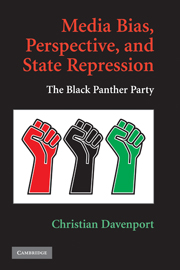Book contents
- Frontmatter
- Contents
- Figures and Tables
- Preface and Acknowledgments
- Media Bias, Perspective, and State Repression
- INTRODUCTION
- Part I Conceptualization
- Part II Cases
- 4 THE BLACK PANTHER PARTY VS. THE UNITED STATES, 1967–1973
- 5 AN EVENT CATALOG OF DISSENT AND REPRESSION
- 6 A MOSAIC OF COERCION
- Part III Conclusion
- Appendix: The Black Panther–U.S. Government Event Catalog
- Bibliography
- Index
4 - THE BLACK PANTHER PARTY VS. THE UNITED STATES, 1967–1973
BACKGROUND
Published online by Cambridge University Press: 05 June 2012
- Frontmatter
- Contents
- Figures and Tables
- Preface and Acknowledgments
- Media Bias, Perspective, and State Repression
- INTRODUCTION
- Part I Conceptualization
- Part II Cases
- 4 THE BLACK PANTHER PARTY VS. THE UNITED STATES, 1967–1973
- 5 AN EVENT CATALOG OF DISSENT AND REPRESSION
- 6 A MOSAIC OF COERCION
- Part III Conclusion
- Appendix: The Black Panther–U.S. Government Event Catalog
- Bibliography
- Index
Summary
The original vision of the Black Panther Party was to serve the needs of the oppressed people in our communities and defend them against their oppressors. When the Party was initiated we knew that these goals would raise the consciousness of the people and motivate them to move more firmly for their total liberation. We also recognized that we live in a country which has become one of the most repressive governments in the world; repressive in communities all over the world. We did not expect such a repressive government to stand idly by while the Black Panther Party went forward to the goal of serving the people. We expected repression.
The Black Panther Party – Dr. Huey P. Newton Foundation (2008)The U.S. government's response to the Oakland/California wing of the Black Panther Party is a very complex one that is difficult to comprehend. Essentially, events took place throughout the Bay Area and throughout California related to the Bay Area chapter: in the streets, in community centers, at the state capitol, at courthouses, in police stations, in parks, and in front of supermarkets. These activities involved thousands of people, with some more visible than others. Because of this situation, there has never really been a rigorous investigation of repression directed against the BPP nor of the behavior of the Panthers themselves directed against authorities and other political-economic elites (Jones 1998). My objective in this chapter is to begin to overcome this limitation.
- Type
- Chapter
- Information
- Media Bias, Perspective, and State RepressionThe Black Panther Party, pp. 93 - 106Publisher: Cambridge University PressPrint publication year: 2009

